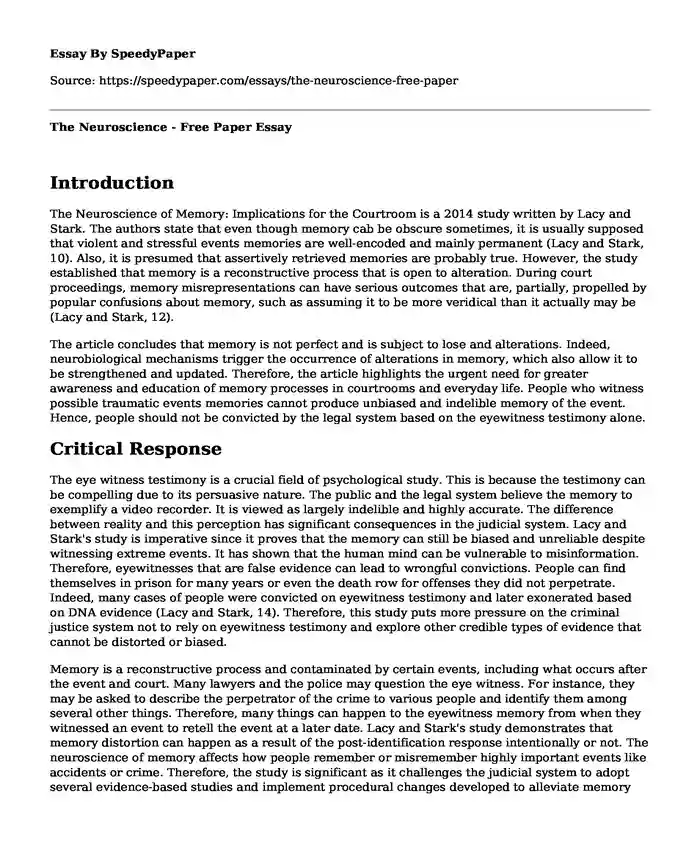
| Type of paper: | Essay |
| Categories: | Science Court system |
| Pages: | 3 |
| Wordcount: | 588 words |
Introduction
The Neuroscience of Memory: Implications for the Courtroom is a 2014 study written by Lacy and Stark. The authors state that even though memory cab be obscure sometimes, it is usually supposed that violent and stressful events memories are well-encoded and mainly permanent (Lacy and Stark, 10). Also, it is presumed that assertively retrieved memories are probably true. However, the study established that memory is a reconstructive process that is open to alteration. During court proceedings, memory misrepresentations can have serious outcomes that are, partially, propelled by popular confusions about memory, such as assuming it to be more veridical than it actually may be (Lacy and Stark, 12).
The article concludes that memory is not perfect and is subject to lose and alterations. Indeed, neurobiological mechanisms trigger the occurrence of alterations in memory, which also allow it to be strengthened and updated. Therefore, the article highlights the urgent need for greater awareness and education of memory processes in courtrooms and everyday life. People who witness possible traumatic events memories cannot produce unbiased and indelible memory of the event. Hence, people should not be convicted by the legal system based on the eyewitness testimony alone.
Critical Response
The eye witness testimony is a crucial field of psychological study. This is because the testimony can be compelling due to its persuasive nature. The public and the legal system believe the memory to exemplify a video recorder. It is viewed as largely indelible and highly accurate. The difference between reality and this perception has significant consequences in the judicial system. Lacy and Stark's study is imperative since it proves that the memory can still be biased and unreliable despite witnessing extreme events. It has shown that the human mind can be vulnerable to misinformation. Therefore, eyewitnesses that are false evidence can lead to wrongful convictions. People can find themselves in prison for many years or even the death row for offenses they did not perpetrate. Indeed, many cases of people were convicted on eyewitness testimony and later exonerated based on DNA evidence (Lacy and Stark, 14). Therefore, this study puts more pressure on the criminal justice system not to rely on eyewitness testimony and explore other credible types of evidence that cannot be distorted or biased.
Memory is a reconstructive process and contaminated by certain events, including what occurs after the event and court. Many lawyers and the police may question the eye witness. For instance, they may be asked to describe the perpetrator of the crime to various people and identify them among several other things. Therefore, many things can happen to the eyewitness memory from when they witnessed an event to retell the event at a later date. Lacy and Stark's study demonstrates that memory distortion can happen as a result of the post-identification response intentionally or not. The neuroscience of memory affects how people remember or misremember highly important events like accidents or crime. Therefore, the study is significant as it challenges the judicial system to adopt several evidence-based studies and implement procedural changes developed to alleviate memory biases' impacts.
Conclusion
In conclusion, Lacy and Stark demonstrate that memory is vulnerable to distortion and loss as such eyewitnesses should not be used alone to convict people since it can be biased. Therefore, the study is significant to the legal system as it reduces evidence falsification and the risk of convicting innocent people.
Work Cited
Lacy, Joyce W., and Craig E. L. Stark. “The Neuroscience of Memory: Implications for the Courtroom.” Nature Reviews Neuroscience, vol. 14, no. 9, 2013, pp. 649–658., DOI:10.1038/nrn3563.
Cite this page
The Neuroscience - Free Paper. (2024, Jan 01). Retrieved from https://speedypaper.com/essays/the-neuroscience-free-paper
Request Removal
If you are the original author of this essay and no longer wish to have it published on the SpeedyPaper website, please click below to request its removal:
- Breathing Liquids for Divers, Free Essay Sample for Your Assignments
- Essay Example: The Gun Violence in America
- Essay Sample on Seneca people
- Free Essay on the Role and Functions of P53 in Tumor
- Free Paper with Some Questions in Architecture
- Essay Example - Enzyme Lab Report
- Essay Sample on Social Class and Political Power
Popular categories




